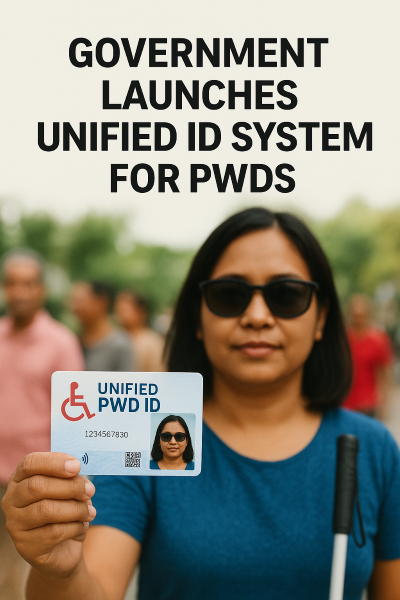
A Milestone Toward Fairness, Dignity, and Protection
For years, one of the most vulnerable sectors in society which is persons with disabilities (PWDs) has been forced to deal not only with their daily struggles but also with the burden of unfair doubt and discrimination. Why? Because of the rampant abuse of fraudulent PWD IDs.
Businesses have long complained about losses due to fake cards, while legitimate PWDs often find themselves in uncomfortable situations, questioned, or even denied the very benefits they rightfully deserve. This long-standing issue has cast a shadow over what was meant to be a system of inclusion and support. But this year marks a turning point.
The Government’s Bold Response
House Speaker Martin Romualdez recently hailed the government’s pilot rollout of the unified identification system for PWDs, calling it a strong and decisive response against fraud.
“This is a strong response to the long-standing abuse of fraudulent PWD IDs that hurt businesses and cast doubt on legitimate beneficiaries,” he said, describing the move as “a milestone in dignity, fairness, and service”.
Romualdez emphasized that the unified ID system is not just about security; it’s about making life easier for PWDs. It ensures that benefits, services, and privileges meant for them are delivered without delay, confusion, or unfair treatment.
And more importantly, it sends a clear message: scammers and opportunists will no longer have free rein to exploit the system.
The Pilot Rollout
The Department of Social Welfare and Development (DSWD), led by Secretary Rex Gatchalian, through the National Council on Disability Affairs (NCDA), has begun the pilot rollout of the unified PWD ID in 35 areas nationwide.
The pilot officially started in San Miguel, Bulacan, and is now being introduced in cities like Pasay, Muntinlupa, and Santa Rosa, Laguna. Other provinces included in the rollout are Pangasinan, Nueva Vizcaya, Rizal, Cavite, Camarines Norte, Aklan, Bohol, Bukidnon, South Cotabato, and even areas within the Bangsamoro Autonomous Region in Muslim Mindanao (BARMM).
An estimated 200,000 PWDs are expected to benefit from this pilot program, with a nationwide full rollout projected to cover two million PWDs in the future.
How the Unified ID Works
Under this new system:
- Local Government Units (LGUs), through their Persons with Disability Affairs Offices (PDAO), will handle application processing, eligibility verification, and approval.
- The NCDA will be in charge of centralized ID printing to maintain uniformity and prevent duplication.
Security Features
The unified PWD ID will carry advanced security layers to prevent fraud and misuse:
- Digital ID accessible via mobile app or web portal.
- QR code for instant verification by business establishments.
- RFID-enabled physical card for added security and protection.
This modernized approach bridges both physical and digital verification, making it harder for fraudsters to fake or replicate IDs.
Why This Matters
Earlier this year, Speaker Romualdez strongly condemned the rampant abuse of fake PWD IDs. He pointed out that while businesses suffer financial losses, the greater injustice lies in how legitimate PWDs are forced to endure suspicion and discrimination.
Think about it: imagine living with a disability and being told you need to “prove” it every time you present your ID. The humiliation alone is enough to discourage many from claiming their rightful benefits.
With the unified ID system, this cycle of doubt can finally end.
Restoring Trust
The initiative is about restoring trust between businesses, the government, and PWDs. Businesses will now have a reliable way to confirm legitimate IDs instantly, while PWDs can confidently present their cards without fear of being dismissed or judged.
Promoting Inclusion
This move is more than just a technical upgrade. It’s a social milestone. By protecting the integrity of PWD IDs, the government reinforces the principle that no one should be left behind.
PWDs deserve systems that work for them, not against them. The unified ID is a step closer to that vision.
Looking Ahead
The success of the pilot rollout will set the tone for a nationwide transformation. With over two million PWDs expected to benefit, the unified ID program has the potential to become one of the most impactful reforms in social welfare.
Of course, challenges remain. Implementation across diverse regions, ensuring smooth adoption of digital tools, and keeping the system fraud-proof are tasks that will require continuous effort and vigilance.
But with Speaker Romualdez, the DSWD, and the NCDA pushing for this initiative, the outlook is promising.
As Romualdez, the principal author of House Bill 16 (which also seeks to enhance discounts for senior citizens and PWDs), puts it:
“Scammers, opportunists and those who want to steal from our vulnerable people will now have a hard time taking advantage from them, and this will eventually be stopped.”
Conclusion
The unified PWD ID system represents more than just a card; it symbolizes dignity, fairness, and protection.
For the PWD community, it’s a promise that their rights will be respected, their benefits safeguarded, and their voices heard.
For businesses, it’s a reassurance that they can continue honoring PWD privileges without fear of being scammed.
And for society, it’s a reminder that true progress is measured not only by economic growth or technological advancement, but by how we treat our most vulnerable members.
The pilot rollout is only the beginning, but it is a beginning worth celebrating.
